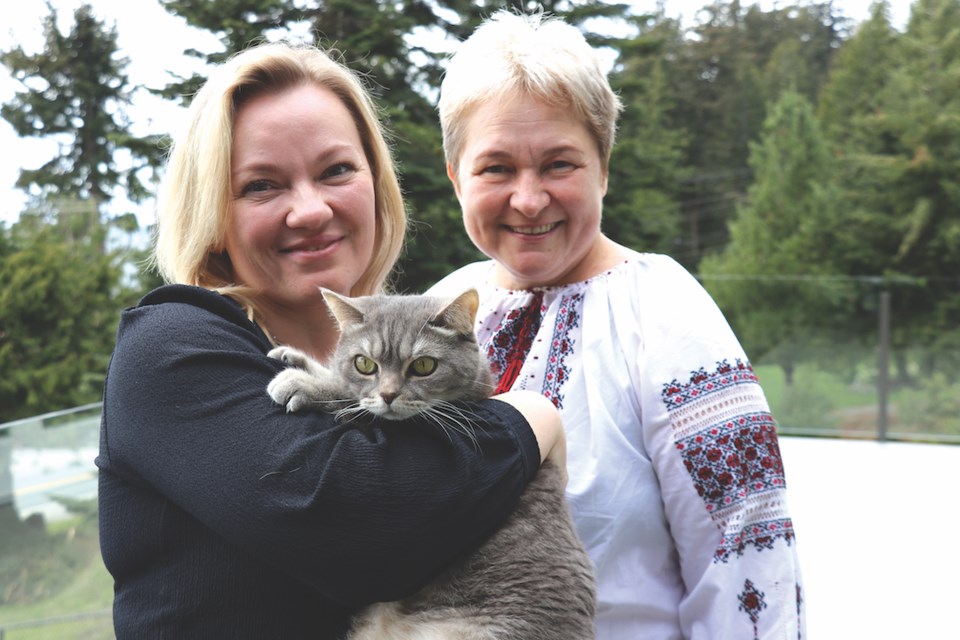It wasn’t the first visit to Canada Olha Liubenko imagined.
On a bluebird day in early April, in a West Sechelt home overlooking the ocean, Liubenko told of her escape from Kyiv and her journey to Canada, as Alex Marinets translated.
Marinets and Liubenko were raised as sisters in Kyiv, Ukraine, though they’re technically aunt and niece. Marinets immigrated to Canada 25 years ago and moved to the Sunshine Coast last December.
Escape from Kyiv
When Liubenko woke up to bombs at 5 a.m. Feb. 24, she thought it was a dream.
For days, she’d ignored the signs: bars going up across the dance studio entrances, TV ads warning people to have grab and go bags ready.
As the windows and doorways shook, and as the television reports caught up with the invasion, she realized the war no one thought would happen, was here.
Liubenko’s son and husband were more than 500 km away, on a skiing trip in the Carpathian mountains – she was in their Kyiv apartment with her 86-year-old grandmother and the cat.
Because the route between Western Ukraine and the capital was bombed out, Liubenko’s son and husband couldn’t get back, so Liubenko and her grandmother had to flee the city. In a matter of minutes the day after the invasion, Liubenko gathered her grandmother, cat, and belongings.
The plan was now to take a long detour around the bombed out route. After managing to fill the car with gas (a feat in and of itself), Liubenko entered a queue of stop and go traffic. Eighteen hours to travel 250 kilometres – if one left the stream of vehicles, their place was forfeited.
Liubenko’s grandmother has a heart condition and isn’t well enough to fly, so had to be left with her sister in Ukraine. After leaving her grandmother with her aunt, Liubenko reunited with her son and husband, and the plan from there was to head to Poland.
The cars had been at a standstill for three days and the concern was the Russians would bomb along the roadway. So, Liubenko and her 16-year-old son, Andrew, walked the rest of the distance to the Polish border, carrying their suitcases, and carrying the cat in a bag around Liubenko’s neck.
Men 18 to 60 aren’t allowed to leave Ukraine. Liubenko’s husband joined the territorial defence, meaning he’s not as trained as the military, but has a weapon and is fighting. “Men mostly want women to go away because then they feel safer for their family. But most of the men want to fight for the country,” Liubenko said. Liubenko saw a lines of thousands at the military gathering place in Western Ukraine – some people are listed as reserves and sent home as there weren’t enough weapons, said Liubenko.
Life in Poland
In Poland, there were places to rest, to have food, to sleep, but then the question was – what next? Liubenko was frozen – she couldn’t imagine her next move.
Everyday life continued in Poland. People on the street would laugh and play, go to movies and concerts – it looked like Ukraine the day before the invasion, said Liubenko. “You don’t feel safe because it’s identical to what you had literally the day before the war,” translated Marinets. “She slept an hour and a half every night.”
Liubenko managed to rent a very small room – her son sleeping on the floor – in Warsaw.
The uneasiness and fear that Poland was next grew as countries traded diplomatic jabs on the world stage.
Reuniting in Canada
It was Marinets who told Liubenko and Andrew to come to Canada. Marinets paid for the visa outright – the refugee program hadn’t yet been established – and filled out the “metres and metres” of application forms.
Because Maks (the cat) didn’t have his shots, the family had to wait an extra 21 days in Europe for the vaccinations to kick in and then flew from Warsaw to Toronto on April 1. On April 3, they arrived in Vancouver and the sisters were reunited.
While grateful to be in Canada and safe, arriving here presented Liubenko with another challenge: the cost of living. When the war started, Liubenko’s company relocated to Poland, so she can still work as she’s a graphic designer, creating animation designs for the likes of YouTube and Facebook, but the money she makes isn’t close to enough to live off of here.
“I would say it’s not even enough for food,” said Marinets.
What could support a good life in Ukraine, isn’t enough to live off of in Canada.
Luckily for Liubenko and Andrew, they have Marinets and her husband, who can help out and who have space for them in their home. Not everyone is so lucky, reflected the sisters.
Roll call
Life in Canada for the Liubenkos starts every morning with a roll call – Canada’s morning is Ukraine’s night. Friends, family, they check in to see if everyone’s alright.
Then, it’s the daily business of setting up a life in Canada, a social insurance number, a BC Services card, a bank account, while the tumult of emotions from the past couple of months continues.“It rips you out of your safety circle,” said Liubenko. “Life changes overnight and there is nothing you can do about it. And you have to either adapt or suffer or ask for help”
The response on the Coast has been incredibly generous, said the sisters. From furnishings to cheques to clothes, people started stepping up. “People try to do whatever they can,” said Marinets.
Once things settle, Andrew will head to school and Liubenko will look for a job in Canada.
As of April 5, the Liubenkos’ home in Ukraine was still standing but when and if a return may be possible is unclear.
But for Liubenko, “My heart is still there.”



